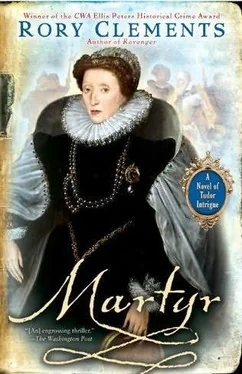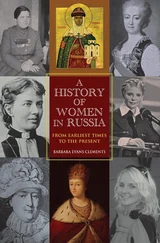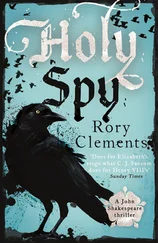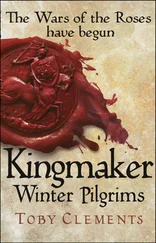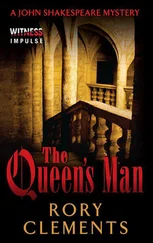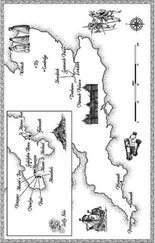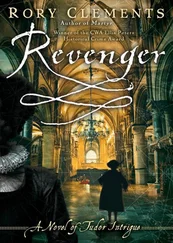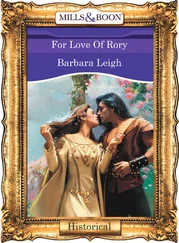Rory Clements - Martyr
Здесь есть возможность читать онлайн «Rory Clements - Martyr» весь текст электронной книги совершенно бесплатно (целиком полную версию без сокращений). В некоторых случаях можно слушать аудио, скачать через торрент в формате fb2 и присутствует краткое содержание. Жанр: Исторический детектив, на английском языке. Описание произведения, (предисловие) а так же отзывы посетителей доступны на портале библиотеки ЛибКат.
- Название:Martyr
- Автор:
- Жанр:
- Год:неизвестен
- ISBN:нет данных
- Рейтинг книги:3 / 5. Голосов: 1
-
Избранное:Добавить в избранное
- Отзывы:
-
Ваша оценка:
- 60
- 1
- 2
- 3
- 4
- 5
Martyr: краткое содержание, описание и аннотация
Предлагаем к чтению аннотацию, описание, краткое содержание или предисловие (зависит от того, что написал сам автор книги «Martyr»). Если вы не нашли необходимую информацию о книге — напишите в комментариях, мы постараемся отыскать её.
Martyr — читать онлайн бесплатно полную книгу (весь текст) целиком
Ниже представлен текст книги, разбитый по страницам. Система сохранения места последней прочитанной страницы, позволяет с удобством читать онлайн бесплатно книгу «Martyr», без необходимости каждый раз заново искать на чём Вы остановились. Поставьте закладку, и сможете в любой момент перейти на страницу, на которой закончили чтение.
Интервал:
Закладка:
Howard said nothing. He stood like a rock.
Perchance, in a day or two you might talk with me, my lord?
Perchance, Mr. Shakespeare. I can promise no more.
One last question. Was she a Roman Catholic?
It seemed to Shakespeare that Howard of Effingham clenched his teeth. He did not answer the question but nodded to his pikemen, then turned and walked to his horse, which was tethered nearby. To Shakespeare, his reaction spoke more than a printed volume could.
As Howard rode away eastward, some apprentices threw snowballs at Shakespeare and one hit him. He laughed and gathered up some snow, crunching it hard together in his gloved hands before flinging it back at the boy.
It was Friday, a fish day. Many days were fish days, as a means of boosting the fortunes of the fishing fleets, but that was no hardship for Shakespeare, who enjoyed fish in all its forms. Soon it would be Lent and then every day would be a fish day. Jane, his maidservant and housekeeper, had given him smoked pike instead of flesh for his breakfast this morning, and he would have some eel and oyster pie before bed.
The trees were decorated white as Shakespeare walked through the streets of high houses, their shutters thrown back to let in the air. Thick wood smoke belched from their chimneys, adding to the permanent city stench of ordure until the mixture clogged the nostrils and the lungs. Summer was the worst, particularly here, near the confluence of the Fleet and the Thames and close to the Fleet and Newgate prisons, where the rotting flesh of dead convicts might be left uncollected for weeks on end; at this time of year, thankfully, the stink retreated to a background whiff.
An endless procession of carts, drays, and wagons, laden with farm produce, barrels, and building materials, trundled nose to tail in both directions, their horses’ ironclad hooves turning the new snow to slush, slipping and stumbling in the endless potholes. There was barely room for them to pass on the narrow streets, and they often ground to a halt, setting the carters to shouting and swearing. At times, blows were exchanged before a beadle interposed and brought some order.
In a few minutes, Shakespeare had followed the road out of the city, over the Fleet river (if such a putrid ditch was deserving of the name river, he thought), soon turning left toward the high, forbidding walls of Bridewell. Every time he came here, he found it difficult to believe that such a dark fortress could ever have been a royal palace, yet barely sixty years ago, Henry-the great Henry-had entertained his Spanish Queen at dinner behind these walls. His son, Edward the Sixth, had handed the dreary place over to the city fathers for the housing of the poor. And now it was little more than a prison for the city’s harlots, gypsies, and vagrants.
A squadron of eight armed men, pursuivants, marched past him with a prisoner, their boots stamping through the snow. They came to a halt, throwing their prisoner to the ground, and their sergeant, whom Shakespeare recognized as one of Topcliffe’s men, hammered on the massive Bridewell door. Almost instantly it was opened by the gaoler, clutching his clanking keys.
A priest of Rome for you, gaoler, the sergeant said.
The gaoler grinned, revealing a couple of brown, broken teeth, but mostly diseased gum. And very welcome he is, too, Master Newall, for his friends will pay well to feed him and keep him alive. They are all welcome here, all your Popish priests.
Well, don’t forget our agreement.
A mark for each, catchpole. Bring them on! Never have I fared so well. Last month they brought me a vicar of the English Church. He starved because no one brought him a crust of bread, and why should I feed him? The Anglicans are like vermin here. Bring me Romans, catchpole, for they do garnish my table.
Newall pulled the priest to his feet and handed him, manacled and shackled, to the gaoler. Mind you work him hard. Get him making nails or stripping oakum to caulk Her Majesty’s ships. And flog him soundly, gaoler, or I shall take him off to the Marshalsea or the Clink, where he should be by rights. The sergeant spotted Shakespeare and grinned. I’m sure Mr. Topcliffe wishes you good cheer, Mr. Shakespeare.
Shakespeare ignored Newall, whom he knew to be of small wit and too close-coupled to Topcliffe for comfort, and walked past the squadron. He nodded to the gaoler, who knew him well, and went through the doorway. He was immediately knocked back by the stink of human dung and sweat. Before him in the first large courtyard and in the cloisters was a swarming mass of the lowliest of humankind. Here were hundreds of beggars, whores, doxies, and orphans. Many had come to London in search of a better life and had been brought here by way of punishment and hoped-for redemption. It was a vain hope. Shakespeare saw their dull eyes as they toiled on the treadmill or performed one or another of a dozen unpleasant tasks set them by the gaoler to pay for whatever food he might consent to give them. The gaoler pushed the newly acquired priest forward into the crowd, where he was seized by a taskmaster.
Some vagabonds were brought here yesterday by Boltfoot Cooper, Shakespeare said at last, when the sergeant and his squadron had gone. I will see them.
The gaoler’s brow creased in puzzlement. Of course, I do remember them, Mr. Shakespeare; they were Irish beggars or some such, I believe. But they were taken away this morning on your orders, sir.
I gave no such orders, turnkey.
But, Mr. Shakespeare, I saw the warrant that the two men brought. It had your mark on it.
My mark? Can you read, turnkey?
Why, yes, sir, enough. Your men said the vagabonds were to be taken to some other gaol as criminals, as I do recall. They had your mittimus from the justice. I have seen many such warrants.
You say my men took them?
Aye, sir, and did leave me a shilling for my trouble.
Shakespeare’s blood rose. How dare Topcliffe cloy away his witnesses?
The gaoler grinned, his mouth hanging open like a Bedlam loon. But tarry a while, Mr. Shakespeare. You be just in time for the Friday floggings. If you’d care to stay and take some wine with me, we can observe them together.
Shakespeare did not dignify the offer with a reply.
Chapter 6
Tramping through the slush in his fine leather boots, with a winter cloak of crimson worsted and white fur, the man called Cotton could not fail to catch the eye of the good-wives, procurers, and water-bearers crowding the muddy, cart-thronged thoroughfare of Long Southwark. Though he was slight and lean, he was striking. Beneath his black velvet hat, embroidered with crimson beads, his hair and beard were golden-red and trimmed short. His gray eyes were at once intense, good-humored, and watchful. He walked briskly, with the confident air of a gentleman who knew his place in the world. For a man who might have wished to go unremarked, he was brazen and conspicuous, but that was the very quality that made him invisible to searchers and pursuivants; they were looking for men in hoods and dark cloaks, loitering in shadows and doorways, and they failed to see what their eyes alighted on so easily.
The weak afternoon light was fading fast as he made his way with purpose southward, past Winchester House, St. Mary Overies, and the inns and bawdy houses, toward the high walls of the Marshalsea prison, where he was immediately given entrance in exchange for a coin.
The gaoler clapped him on the back in welcome. Mr. Cotton, sir, it is good to see you again.
And you, gaoler.
The gaoler, a big, long-bearded man with a heavy woolen smock and wide leather key-belt strapped tight around his great belly, grinned broadly at Cotton as if waiting for a reaction.
Well? he said at last. Do you not notice something about the place, Mr. Cotton?
Читать дальшеИнтервал:
Закладка:
Похожие книги на «Martyr»
Представляем Вашему вниманию похожие книги на «Martyr» списком для выбора. Мы отобрали схожую по названию и смыслу литературу в надежде предоставить читателям больше вариантов отыскать новые, интересные, ещё непрочитанные произведения.
Обсуждение, отзывы о книге «Martyr» и просто собственные мнения читателей. Оставьте ваши комментарии, напишите, что Вы думаете о произведении, его смысле или главных героях. Укажите что конкретно понравилось, а что нет, и почему Вы так считаете.
